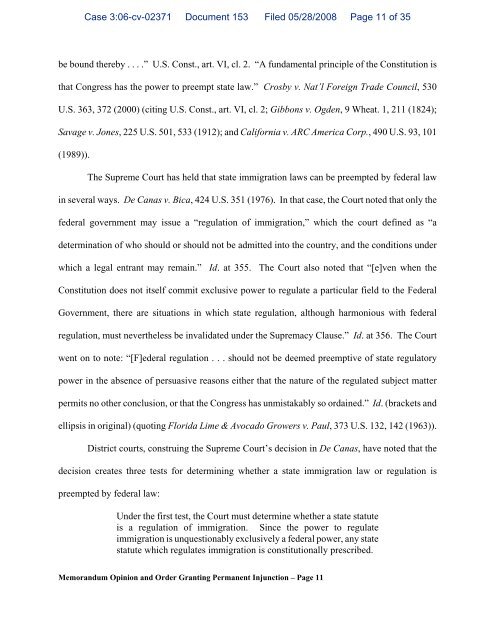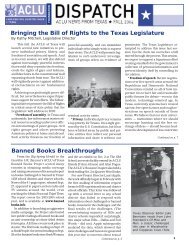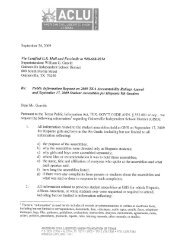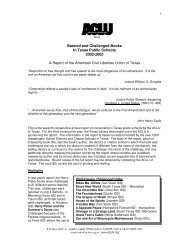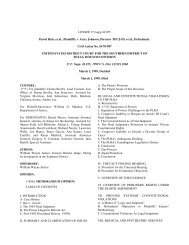Order Granting Permanent Injunction - maldef
Order Granting Permanent Injunction - maldef
Order Granting Permanent Injunction - maldef
You also want an ePaper? Increase the reach of your titles
YUMPU automatically turns print PDFs into web optimized ePapers that Google loves.
Case 3:06-cv-02371 Document 153 Filed 05/28/2008 Page 11 of 35<br />
be bound thereby . . . .” U.S. Const., art. VI, cl. 2. “A fundamental principle of the Constitution is<br />
that Congress has the power to preempt state law.” Crosby v. Nat’l Foreign Trade Council, 530<br />
U.S. 363, 372 (2000) (citing U.S. Const., art. VI, cl. 2; Gibbons v. Ogden, 9 Wheat. 1, 211 (1824);<br />
Savage v. Jones, 225 U.S. 501, 533 (1912); and California v. ARC America Corp., 490 U.S. 93, 101<br />
(1989)).<br />
The Supreme Court has held that state immigration laws can be preempted by federal law<br />
in several ways. De Canas v. Bica, 424 U.S. 351 (1976). In that case, the Court noted that only the<br />
federal government may issue a “regulation of immigration,” which the court defined as “a<br />
determination of who should or should not be admitted into the country, and the conditions under<br />
which a legal entrant may remain.” Id. at 355. The Court also noted that “[e]ven when the<br />
Constitution does not itself commit exclusive power to regulate a particular field to the Federal<br />
Government, there are situations in which state regulation, although harmonious with federal<br />
regulation, must nevertheless be invalidated under the Supremacy Clause.” Id. at 356. The Court<br />
went on to note: “[F]ederal regulation . . . should not be deemed preemptive of state regulatory<br />
power in the absence of persuasive reasons either that the nature of the regulated subject matter<br />
permits no other conclusion, or that the Congress has unmistakably so ordained.” Id. (brackets and<br />
ellipsis in original) (quoting Florida Lime & Avocado Growers v. Paul, 373 U.S. 132, 142 (1963)).<br />
District courts, construing the Supreme Court’s decision in De Canas, have noted that the<br />
decision creates three tests for determining whether a state immigration law or regulation is<br />
preempted by federal law:<br />
Under the first test, the Court must determine whether a state statute<br />
is a regulation of immigration. Since the power to regulate<br />
immigration is unquestionably exclusively a federal power, any state<br />
statute which regulates immigration is constitutionally prescribed.<br />
Memorandum Opinion and <strong>Order</strong> <strong>Granting</strong> <strong>Permanent</strong> <strong>Injunction</strong> – Page 11


